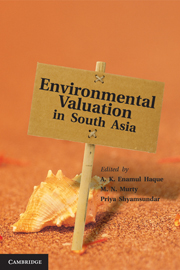Book contents
- Frontmatter
- Contents
- List of Figures
- List of Tables
- List of Appendices
- List of Contributors
- Preface
- Chapter 1 Introduction
- Chapter 2 Environmental Valuation: A Review of Methods
- Chapter 3 Valuing the Environment as a Production Input
- Chapter 4 Should Shrimp Farmers Pay Paddy Farmers?: The Challenges of Examining Salinization Externalities in South India
- Chapter 5 Evaluating Gains from De-Eutrophication of the Dutch Canal in Sri Lanka
- Chapter 6 Pesticide Productivity and Vegetable Farming in Nepal
- Chapter 7 Forests, Hydrological Services, and Agricultural Income: A Case Study from the Western Ghats of India
- Chapter 8 Can Mangroves Minimize Property Loss during Big Storms?: An Analysis of House Damages due to the Super Cyclone in Orissa
- Chapter 9 Valuation of Recreational Amenities from Environmental Resources: The Case of Two National Parks in Northern Pakistan
- Chapter 10 Valuing the Land of Tigers: What Indian Visitors Reveal
- Chapter 11 Estimating Welfare Losses from Urban Air Pollution using Panel Data from Household Health Diaries
- Chapter 12 Children in the Slums of Dhaka: Diarrhoea Prevalence and its Implications
- Chapter 13 Red Wells, Green Wells and the Costs of Arsenic Contamination in Bangladesh
- Chapter 14 Air Quality and Cement Production: Examining the Implications of Point Source Pollution in Sri Lanka
- Chapter 15 Revisiting the Need for Improved Stoves: Estimating Health, Time and Carbon Benefits
- Chapter 16 Benefits from Reduced Air Pollution in Delhi and Kolkata: A Hedonic Property Price Approach
- Chapter 17 The Value of Statistical Life
- Chapter 18 An Assessment of Demand for Improved Household Water Supply in Southwest Sri Lanka
- Index
Preface
Published online by Cambridge University Press: 05 November 2012
- Frontmatter
- Contents
- List of Figures
- List of Tables
- List of Appendices
- List of Contributors
- Preface
- Chapter 1 Introduction
- Chapter 2 Environmental Valuation: A Review of Methods
- Chapter 3 Valuing the Environment as a Production Input
- Chapter 4 Should Shrimp Farmers Pay Paddy Farmers?: The Challenges of Examining Salinization Externalities in South India
- Chapter 5 Evaluating Gains from De-Eutrophication of the Dutch Canal in Sri Lanka
- Chapter 6 Pesticide Productivity and Vegetable Farming in Nepal
- Chapter 7 Forests, Hydrological Services, and Agricultural Income: A Case Study from the Western Ghats of India
- Chapter 8 Can Mangroves Minimize Property Loss during Big Storms?: An Analysis of House Damages due to the Super Cyclone in Orissa
- Chapter 9 Valuation of Recreational Amenities from Environmental Resources: The Case of Two National Parks in Northern Pakistan
- Chapter 10 Valuing the Land of Tigers: What Indian Visitors Reveal
- Chapter 11 Estimating Welfare Losses from Urban Air Pollution using Panel Data from Household Health Diaries
- Chapter 12 Children in the Slums of Dhaka: Diarrhoea Prevalence and its Implications
- Chapter 13 Red Wells, Green Wells and the Costs of Arsenic Contamination in Bangladesh
- Chapter 14 Air Quality and Cement Production: Examining the Implications of Point Source Pollution in Sri Lanka
- Chapter 15 Revisiting the Need for Improved Stoves: Estimating Health, Time and Carbon Benefits
- Chapter 16 Benefits from Reduced Air Pollution in Delhi and Kolkata: A Hedonic Property Price Approach
- Chapter 17 The Value of Statistical Life
- Chapter 18 An Assessment of Demand for Improved Household Water Supply in Southwest Sri Lanka
- Index
Summary
Applied research in environmental economics has gained momentum in recent times and is viewed as a means to aid environmental management. The South Asian Network for Development Economics and Environment (SANDEE) has contributed to this momentum in South Asia, a region with a vast and growing ecological footprint. During the last ten years, SANDEE has sponsored research on several aspects of environment and development. It has also organized numerous workshops to meet training needs.
SANDEE uses innovative strategies to build capacity in environmental economics. Researchers and managers from universities, governments and NGOs are provided with repeated opportunities to improve their skills. The process for an economist to produce a useful piece of research is detailed. It involves his/her attending a teaching workshop, writing a research proposal related to an environmental problem in his/her country, presenting ongoing research to receive comments, receiving guidance from a SANDEE advisor and writing a manuscript. The final research output is peer-reviewed by an international expert. Thus, SANDEE research is grounded in the realities of local problems but benefits from the advice of scholars from around the world.
This book contains contributions from SANDEE researchers and advisors. The papers in the book are on environmental valuation in South Asia and provide information for designing sustainable development policies. They constitute detailed micro case studies of air, water, land and forest resources from the region.
- Type
- Chapter
- Information
- Environmental Valuation in South Asia , pp. xxi - xxiiPublisher: Cambridge University PressPrint publication year: 2011



